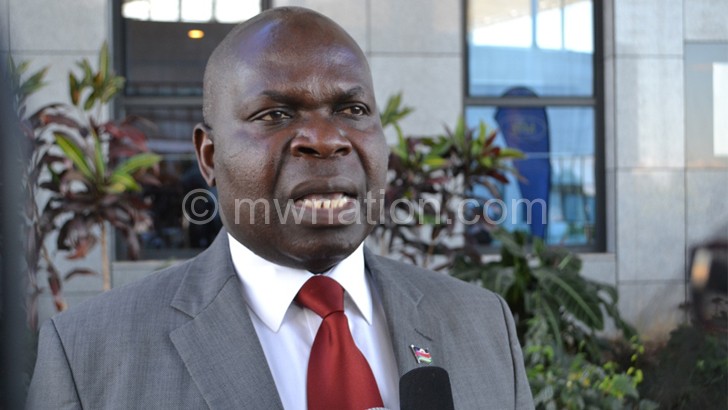Towards science generation
With plastic papers, wires, pipes and other readily available materials, a group sits to assemble what they call a digestion system model. Before them hangs a placard that reads ‘Lidoma Private Secondary School’.
These students are on a quest to win the 2014 National Schools Science Fair (NSSF).
Listening to them talking about how the artificial digestion works, leaves one spellbound to believe that even without a text book and expensive laboratory apparatus, any teacher can make a student understand how the human digestive system works. Even the judges could not do otherwise, but crown the school, the 2014 NSSF champions.
Austin Madinga, a teacher at Kamuzu Academy (KA) and coordinator of NSSF, describes the model as one of the most fascinating science innovations, saying it can be used even in a rural setup and save money spent on laboratory equipment.

Madinga says such innovations are relevant to Malawi as most schools have insufficient teaching materials.
“Their product is a science innovation idea that can save resources,” he says.
NSSF is one of National Commission of Science and Technology (NCST) programmes coined by government to influence youths into science innovations. The fair started in 2009 and each year, new science ideas and products are displayed. Currently, NCST and its partners are waiting for the results of an evaluation exercise of the initiative.
“Until the results are out, we will be able to explain the impact of the initiative because the report will tell us whether the innovations are being adopted or not,” says Madinga.

Meanwhile, government is focused on having science as a mandatory subject in all schools. To this end, government needs to procure laboratory materials and mobile laboratories, which come at a huge cost.
Government also opened the Malawi University of Science and Technology (Must) to provide specialised training in science and technology at tertiary level.
This week, Malawi joined the world in commemorating the International World Day of Science for development. But does the country need science to develop?
Anthony Muyepa-Phiri, director general for NCST, says science and technology have become key drivers to development and that for Malawi to develop, there is need to make tangible developments in the field of science and promote research, technology and innovations.
“This scientific development will lead to scientific advancements that will translate into economic advancements through improvements in education, health, medicine and infrastructure, among others. This will lead to the socio-economic development of the people,” he says.
Muyepa-Phiri reckons that as Malawi depends on agriculture, science would inform agriculture and bring about a modern and vibrant agriculture sector as a result of a rigorous research.
“This can tremendously push the country to greater heights by producing more yields which will contribute favourably to the country’s gross domestic product [GDP],” he says.
Sekani Mkonda, director of programmes and management at Malawi Enterprise Zone Association (Meza), says at the speed with which technology advances, understanding of science is a crucial part of a rounded education. He argues that Malawi needs more scientists to compete on the global arena.
He argues: “Science and technology are engines of modernisation. For decades agricultural science has focused on boosting production through the development of new technologies. This has achieved enormous yield gains as well as lower costs for large-scale farming. But this success has come at a high environmental cost. It has not solved the socio-economic problems of the poor.”
Mkonda believes only agriculture science can address Malawi’s challenges
On the other hand, Muyepa-Phiri says government has not assumed scientific leadership and has not put in place a deliberate plan to develop research and innovation.
He adds that so many technologies have been developed, but have not been transferred and commercialised and most researches have not informed policy because they end as recommendations instead of being used to direct the policies
“Let science, research and technology be appreciated as an essential ingredient towards the country’s socio-economic growth,” says Muyepa-Phiri.
Minister of Education, Science and Technology (Moest) Emmanuel Fabiano says Malawi is on track in science and has the potential to do well in science innovations.
He cites such skills as exposed by Chancellor College student Mixon Faluweki, who invented the bicycle charger.
The minister says today’s science thrives on simple equipment and therefore, there are no excuses.
“Government is serious about science innovation because with the growing technology, we need a generation that is science-oriented and equipped. This is why we have Must and we have challenged them to champion this mission and do more researches. This applies to other colleges. We want them to add value to industries and carry out research focusing on developing products. Teaching alone will take us nowhere,” says Fabiano, adding that science prepares individuals to be innovators and create more jobs, thereby reducing unemployment.
On the economy, the minister says science can help to add value and improve quality of products for exports such including mineral resources. He also trashed assertions that the University of Malawi (Unima) has little to show as science innovations, saying the university has done a lot over the past 50years.
“If something is not publicised, does it mean it does not exist? I have been in Unima and I have seen several science innovations by students that also excelled at international forums. The question we should be asking is: where are we on those ideas and how can we improve their impact,” argues Fabiano.





